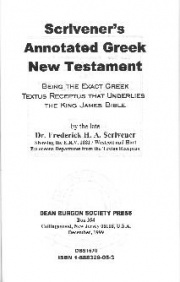Frederick Henry Ambrose Scrivener
From Textus Receptus
The Reverend Frederick Henry Ambrose Scrivener, LL.D. (September 29 1813, Bermondsey, Surrey - October 30 1891, Hendon, Middlesex) was an important text critic of the New Testament and a member of the English New Testament Revision Committee which produced the Revised Version of the Bible.
Graduating from Trinity College, Cambridge in 1835 after studying at Southwark, he became a teacher of classics at a number of schools in southern England, and from 1846 to 1856 was headmaster of a school in Falmouth, Cornwall. He was also for 15 years rector of Gerrans, Cornwall.
Initially making a name for himself editing the Codex Bezae Cantabrigiensis, Ambrose edited several editions of the New Testament and collated the Codex Sinaiticus with the Textus Receptus. For his services to textual criticism and the understanding of Biblical manuscripts, he was voted a Civil list pension in 1872. He was an advocate of the Text of majority over more modern manuscripts as a source for Bible translations. Scrivener was the first scholar who distinguish Textus Receptus from text of majority (the Byzantine text). He supported The Byzantine text in its early stage.
In 1874, he became prebendary of Exeter and vicar of Hendon, where he remained for the rest of his life.
Works
- A Supplement to the Authorized English Version of the New Testament: Being a Critical Illustration of its More Difficult Passages from the Syriac, Latin, and Earlier English Versions, with an Introduction, 1845.
- A Plain Introduction to the Criticism of the New Testament, 1861, 1894.
- A full and exact Collation of about twenty Greek manuscripts of the Holy Gospels (London 1853).
- A Full Collation of the Sinaitic MS. with the Received Text of the New Testament. 1864.
- A full and exact collation of Codex Sinaiticus, 1864.
- Bezae Codex Cantabrigiensis: being an exact Copy, in ordinary Type, of the celebrated Uncial Graeco-Latin Manuscript of the Four Gospels and Acts of the Apostles, written early in the Sixth Century, and presented to the University of Cambridge by Theodore Beza A.D. 1581. Edited, with a critical Introduction, Annotations, and Facsimiles, 1864.
- Six Lectures on the Text of the New Testament and the Ancient Manuscripts which contain it, Deighton, Bell, and Co: Cambridge; London, 1875.
- The New Testament in the Original Greek according to the Text followed in the Authorized Version, together with the Variations adopted in the Revised Version, 1881.
- A Plain Introduction to the Criticism of the New Testament, for the Use of Biblical Students (published posthumously and coauthored by Edward Miller), 1894.

